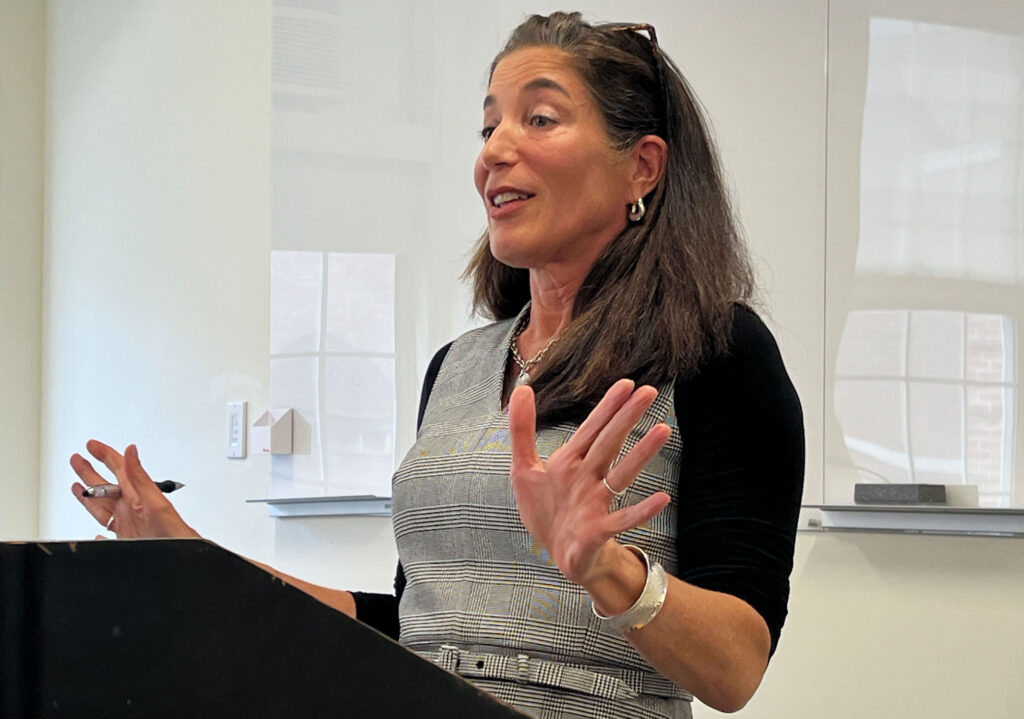On the eve of election day 2024, the future of the Electoral College is top of mind for many. A recent Pew Research Center poll found that more than 60 percent of Americans now prefer moving away from the Electoral College. That popular surge of opposition is starting to show up in the legislature as well. As of late October, seventeen states, representing 209 electoral votes, had signed on to the National Popular Vote Law, a proposition that would bind the electoral votes of each of those states to the candidate who wins the national popular vote, regardless of the voting outcome within that particular state.
On October 30, Boston College Law’s Federalist Society hosted Jennifer Braceras, a member of the society’s Board of Visitors, a lawyer, columnist, advocate, and former professor of civil rights and constitutional law at BC, argued that, while flawed, the Electoral College remains America’s best option for ensuring fair and representative elections.
For some, retaining a system created in the heyday of the horse and buggies may seem antiquated, but for Braceras, the Electoral College better serves the country today than it ever has. “I think our founders were pretty prescient in understanding that we were a diverse country, and that you’re always going to, in a country as large and diverse as ours, have political factions and extremes,” she said. “And so how do we protect people from those extremes and encourage moderation, collaboration, compromise? And the system they came up with is really an ingenious way of doing that.”
While a plebiscite may seem fair on its face, Braceras pushes back on that notion, saying it will lead to further repression of minority rights and further erosion of trust in American democracy.
To the first point, Braceras said that preserving the Electoral College better protects the interests of minority groups than the alternative. A straight popular vote, or what she called a “pure democracy” system, would, in her view, centralize the power of the vote to the largest groups in a way that endangers minority rights. “Whether you’re a geographic minority, a racial and ethnic minority, any type of minority in this country, you have to remember that pure democracy is, as Ben Franklin said, two wolves and a lamb voting on what’s for lunch.”
Braceras went on to say, in that scenario, you do not want to be the lamb. Moreover, she contends that the Electoral College promotes building a diverse coalition of voters, a key piece of any representative democracy.
“The Native American population is extremely important in some of the smaller Western states, the Black population in the District of Columbia and lots of other places; it has much more of an influence in those places than it does overall as a nation. So, the Electoral College protects the rights of the minority, whether it be smaller states or discreet and insular racial or ethnic groups,” she said.
On the second point, Braceras argued that while we have seen election violence occur in the aftermath of recent elections, the broader historical view demonstrates that the Electoral College instills more confidence in election outcomes, rather than less.
“The truth is that in most elections, Electoral College victories have been decisive, which is one of the reasons I think it’s such a good system,” Braceras said. “Because even when our elections are incredibly close in terms of the number of actual votes cast, the winner is clear on the Electoral College. And because of that, we avoid litigation and recounts and arguing about the election overall.”
While the Electoral College’s opposition claims that it erodes faith in our electoral system, Braceras said that replacing it with a direct vote could prove more destabilizing than the remaining with the status quo.
“John F. Kennedy described the structural constitution as a solar system, of which the Electoral College is just one piece. And if you take that piece out, it throws off the whole thing, right?”
Removing that piece, she maintained, throws the entire system into question: Why have unelected Supreme Court justices, or a bicameral legislature, separation of powers, and so on. As a result, Braceras pointed to a possible future where our two-party system disappears, resulting in more plurality presidents who may be even less representative of the citizenry, and with an increasing amount of political extremism and party splintering.
In the end, while urging for the country to retain the status quo when it comes to process, Braceras still sees a need for change in how many Americans approach election season. She emphasized that the clearest way to ensure fair elections is through a renewed emphasis on education and getting out the vote. “I think the most important thing we can do to make our elections fairer is to educate people about the Electoral College system, how it works, why your vote matters, encourage everybody to vote, and get out the vote in all places,” she said.
Photograph by Vicki Sanders


